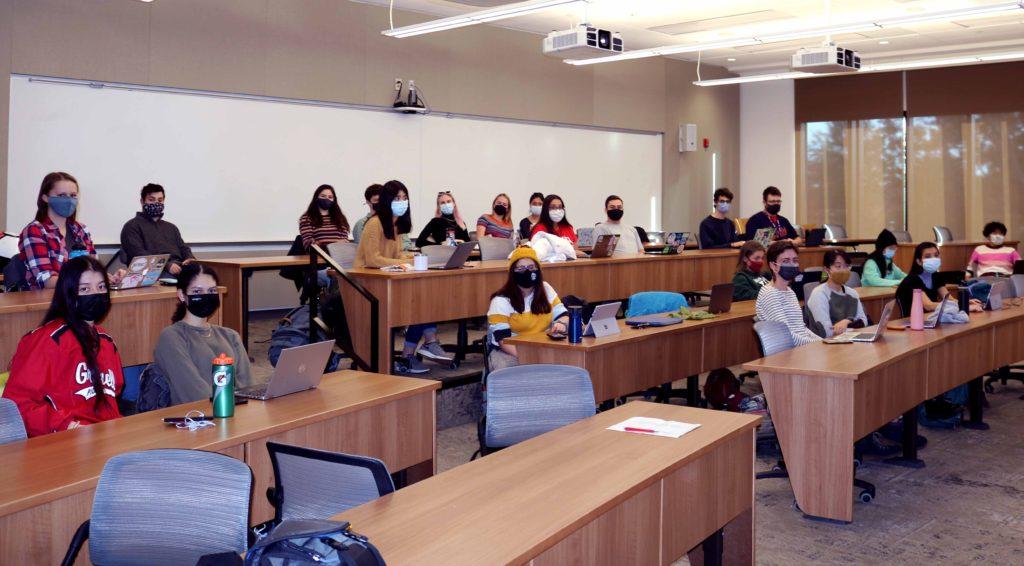Three new Student Education Policy Committee (SEPC) coordinators began their terms this academic year, supplementing the single coordinator role that has existed since 2019. Ashton Aveling `22, vice president of academic affairs, made the decision to increase the number of people in this role. The coordinators, whose purviews are split up by department, are Zaen Chou `24 (coordinator for science), Camila Hassler `22 (coordinator for social studies), Cynthia Hu `23 (coordinator for humanities) and Valentina Mercado `23 (coordinator for interdisciplinary studies).
In an email to the Scarlet & Black, Aveling wrote that he decided to hire four coordinators instead of one this past summer “after discussions with staff in the College’s Academic Affairs division and a review of the labor required to support SEPCs this year considering the effects of prior staffing limitations.” Aveling’s position, vice president of academic affairs (VPAA), was born out of a need for student representation in the academic departments to be legitimized. The VPAA helps ensure that SEPCs can well-represent the different majors and connect to faculty. Coordinators are paid positions, unlike SEPC positions. “We are still trying to push for the SEPCs to get compensated, but for now, the reason why we are hired is because we can legitimately get paid,” said Aveling. “We work on fundamental issues that can lessen [the workload] and improve their work environment.”
SEPCs function as a liaison between professors and students, to create community within majors and as advocacy groups for different academic departments. Coordinators help to legitimize and build up infrastructures within which SEPCs operate, such as by creating templates for the SEPC hiring process and organizing the SEPC budget. Part of the coordinator role is constantly envisioning what the SEPC should become. SEPC members also relate to their department on an individual level, offering their advice and counsel to students of a given major.
SEPCs are involved in the faculty hiring and review processes, for example. Hassler described how members conduct interviews with students from the department of a given candidate under review. “A lot of departments have lost quite a bit of professors during the pandemic, so the SEPC is essential to do that [faculty hiring].” The coordinators provide guidance to the SEPCs in handling faculty reviews, creating guides and templates for them to use throughout the process.
This year, the coordinators’ purpose is particularly salient, as there are an unusually high number of candidates under review and many SEPC members are underclassmen. Chou emphasized the extensive responsibilities of coordinators. “Faculty reviews, especially this year, place a large burden on the SEPCs because so many professors are on the tenure track.” He referenced the College’s position to extend the tenure track faculty by 10 to 20 percent.
Each of the coordinators also belongs to an SEPC. Due to the nature of each department (the Chinese and Japanese department only having nine students total, for example) the organization of each SEPC differs, as does the role of the coordinator for that division. For example, some departments have had more faculty reviews this year than others, and some plan larger and more frequent events. Chou explained: “Senate is a representation of students’ social life and well-being, and we try to represent students in an academic way, trying to build a community within a certain department. … It’s basically another senate for student academics, in a way. That’s what we’re trying to be.”
With more student representation in academic departments, Chou explained, “We will have more legitimacy, so the students are more comfortable and more empowered to talk to the SEPCs, and then the faculty will say ‘we can rely on the students,’ so the ‘self-gov’ structure of the school can actually function.” After Human Resources approved additional coordinator roles, SGA created a standardized interview questionnaire for the coordinator role. A hiring committee reviewed written applications.
Coordinators regularly meet with SEPCs from the departments within their division. During their check-ins, coordinators help SEPCs to prepare for the next Student Council on Curriculum (SCC) meeting and address complaints that may arise from within their department. SCC forums enable student representatives to discuss the operations of academic structures and curricula, as well as to collaborate on events and programming.
The Spanish SEPC recently held a Día de los Muertos event, and the Sociology SEPC has assisted with various sociology major welcome events that the Sociology Department hosted. SEPCs will soon submit a calendar of events that they are planning for the rest of the year, which will be publicized on the Campus Calendar for all Grinnell students, staff and faculty to view. Events that SEPCs schedule are discussed at SCC meetings, which includes members from each SEPC and are chaired by the VPAA.
SCC meets five times per semester, and meetings are open to all students, not just SEPC members. They will convene in HSSC S3325 on December 16 at 5 p.m.
























































